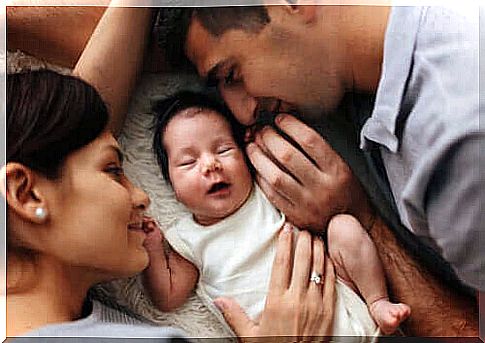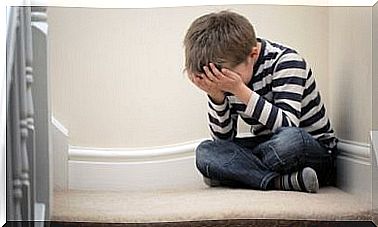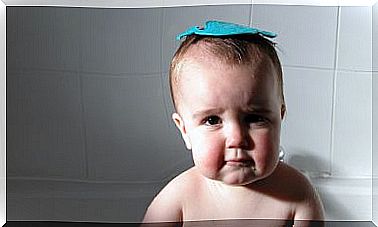How Does Your Baby’s Sleep Pattern Change?

Babies’ sleep patterns change as they get older. Not getting enough sleep will affect a child’s physical and mental health. It will also affect the rest of the family.
As parents, we certainly remember all those nights of interrupted sleep because we had to feed our child. Of course we would have liked a good night’s sleep, but the way babies and children sleep is different than when they are older.
How do babies’ sleep patterns change? How many hours should babies and children sleep ? We will answer these questions in the following paragraphs.
Babies’ sleep patterns change as they get older
First, we must say that evolving the sleep pattern means that it changes with the age of the child. Babies from 0 to 4 months old need to learn how to sleep, so a 3-month-old doesn’t sleep the same way a 7-year-old does. Children all have different needs, so their sleeping patterns may not be the same.
The circadian rhythm is responsible for our sleep. It regulates the amount of melatonin we need – this is the hormone that allows us to relax. It also determines how much of the stress hormone (cortisol) should be released. This rhythm is regulated by the alternation of day and night. It is also key to, among other things, cell regeneration and brain activity.

In babies younger than 4 months, the circadian rhythm does not work yet. It is regulated by daylight, while a baby cannot yet distinguish when it is day and when it is night. This is why they do not have the necessary sleep pattern to fall asleep. This will develop later.
How do babies sleep in the first few months?
Until they are 4 months old, babies wake up because they have needs such as hunger, thirst, or because they are uncomfortable. Their sleep cycles last approximately between 40 and 50 minutes.
When they are 4 months old, they begin to develop their circadian rhythm and sleep patterns will be based on this. This consists of five phases: one REM phase and four non-REM phases. At this point, their sleep cycles can last between 90 and 120 minutes.
So now is the perfect time to develop a sleep pattern that we want them to learn. From this moment on, your child will have to sleep less and less during the day.
How much should a child sleep, based on his or her age?
Just like adults, children become irritable when they don’t get enough sleep. They are also less able to concentrate and perform tasks less well.
As parents, one of our biggest questions is how many hours of sleep children need. We are going to try to answer this question using the information from the American Pediatric Association .
The Sleeping Pattern of a Newborn Baby
Newborn babies have to sleep many hours a day because they are still developing. This means that they can sleep 17 hours or even longer, both during the day and at night.
4 to 12 months
A baby of this age should sleep 12 to 16 hours a day.
- From 4-5 months: 4 hours of sleep during the day (divided into 3 naps)
- From 6 months: 3 hours per day (divided into 2 naps)
The sleeping patterns of babies from 1 to 2 years old
Babies between the ages of 1 and 2 need 11 to 14 hours of sleep, including naps. At this age, they only need to take one nap during the day. This should take between 1.5 and 2 hours.

From 3 to 5 years old
Children between 3 and 5 years old need 10 to 13 hours of sleep and take a daily nap.
Children from 6 to 12 years old
When a child is between six and 12 years old, he or she needs less sleep. The average is between 9 and 12 hours a day, depending on the child.
During puberty
Teens need 8 to 10 hours of sleep every day. While it is more difficult at this age to monitor how long our children sleep, it is important to explain to them how important adequate sleep is for their physical and mental health.
Tips to improve children’s sleep patterns
In order for children to sleep well, it is important to learn sleeping habits. As we have already mentioned, it is best to do this when your child is 4 months old; this is when their sleep patterns begin to regulate. Let’s take a look at some tips to help your kids sleep better.
Establish a bedtime routine
Repeating the same routine every day before putting our kids to bed can help them relax and prepare for sleep. An example of a routine is: shower before dinner, eat, read a story and then go to bed.
Create a sleep improvement schedule
This is very important. We need to get our kids used to going to bed and waking up at the same time every day. This also helps them to get enough sleep.
No television, tablet or mobile phone for sleeping
The light from screens activates children’s brains, preventing them from relaxing. Therefore, you should avoid using these devices. Instead, you can have a nice chat or read a book together.
Make sure the bedroom is suitable for sleeping
The bedroom should have the right conditions for sleeping, such as the right temperature, good ventilation, sufficient humidity (especially if you have heating), no noise, etc.
In short, children’s sleep patterns change a lot during their development. This is because their needs are constantly changing as they get older.
By following these tips you can ensure that your child gets a good sleep pattern. If you were not aware of this before, you will see how important it is for children to get enough sleep. Sleep needed for optimal physical and mental health.









